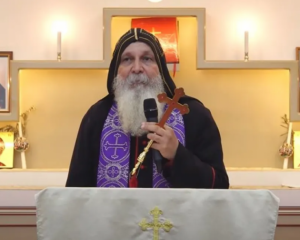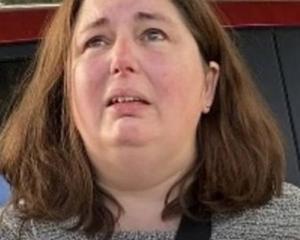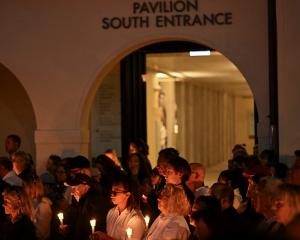Moscow shipped more troops and armour into Crimea on Friday and repeated its threat to invade other parts of Ukraine in response to violence in Donetsk on Thursday night, showing no sign of bowing to Western demands to pull back.
EU diplomats will choose from a long list of 120-130 possible Russian targets for sanctions on Sunday, as pro-Moscow authorities who have taken power in Crimea hold a vote to join Russia in the worst East-West confrontation since the Cold War.
But European diplomats dismissed a German newspaper report that said the list would include the heads of Russia's two biggest companies, energey giants Gazprom and Rosneft.
U.S. Secretary of State John Kerry said Russia would be guilty of a backdoor annexation of Crimea if its parliament ratified the Crimea referendum, which is taking place after an armed takeover of Crimea and gives voters no chance to say "no".
Russia's foreign minister, speaking after crisis talks with Kerry, played down his own ministry's threat of wider conflict, saying Moscow had no plans to invade Russian-speaking eastern Ukraine, where pro-Moscow forces have occupied state buildings.
But he said Russia would respect the referendum result.
Russia's stock markets tumbled and the cost of insuring its debt soared on the last day of trading before the Crimea vote.
European officials told Reuters the EU was working on a five page list of 120-130 Russians who could be subjected to asset freezes and travel bans. An EU diplomat said he expected the final list of those to be sanctioned to be between "tens and scores" of people on Monday.
Germany's Bild newspaper reported that Alexei Miller, boss of natural gas monopoly Gazprom, and Igor Sechin, head of Russia's biggest oil firm Rosneft, would be among those targeted, along with senior ministers and Kremlin aides.
Reuters was not immediately able to confirm the Bild report and European diplomats dismissed it.
"(Business interests) is not the target initially, the focus is on the political decision that has been taken to act in Crimea and destabilise Ukraine," said one diplomat involved in the negotiations.
Rosneft spokesman Mikhail Leontyev said sanctions on his firm's boss would be "stupid, petty and obvious sabotage of themselves most of all. I think it will primarily affect Rosneft's business partners in the West in an extraordinary way." Gazprom and the Kremlin declined to comment.
FELLOW CITIZENS
The Russian Foreign Ministry, responding to the death of at least one protester in Ukraine's eastern city of Donetsk, repeated President Vladimir Putin's declaration of the right to invade to protect Russian citizens and "compatriots".
"Russia is aware of its responsibility for the lives of compatriots and fellow citizens in Ukraine and reserves the right to take people under its protection," it said.
Ukrainian health authorities say one 22-year-old man was stabbed to death and at least 15 others were being treated in hospital after clashes in Donetsk, the mainly Russian-speaking home city of Ukraine's ousted President Viktor Yanukovich.
Organisers of the anti-Moscow demonstration said the dead man was from their group.
Moscow denies that its forces are intervening in Crimea, an assertion Washington ridicules as "Putin's fiction". Journalists have seen Russian forces operating openly in their thousands over the past two weeks, driving in armoured columns of vehicles with Russian licence plates and identifying themselves to besieged Ukrainian troops as members of Russia's armed forces.
A Reuters reporter watched a Russian warship unload trucks, troops and at least one armoured personnel carrier at Kazachaya bay near Sevastopol on Friday morning. Trucks drove off a ramp from the Yamal 156, a large landing ship that can carry more than 300 troops and up to a dozen APCs.
In nearby Simferopol, around 300 Tatars protested against the referendum. Tatars, a majority in Crimea until Soviet leader Josef Stalin deported them en masse for alleged collaboration with the Nazis in World War Two, are strongly anti-Russian.
FACTS ON THE GROUND
Russian troops seized the Black Sea peninsula two weeks ago as a pro-Moscow regional government took power there. The new regional authorities intend to secede from Ukraine and join Russia in a vote described in the West as illegal.
U.S. President Barack Obama said he still hoped for a diplomatic solution, but Russia has shown no sign of veering from Putin's plan to annex Crimea.
Putin declared on March 1 that Russia had the right to invade its neighbour, a week after its ally Yanukovich fled the Ukrainian capital following three months of demonstrations that ended with about 100 people killed in the final days.
In further signs of Moscow's belligerent posture ahead of the Crimea vote, the Defence Ministry announced on Friday it would hold exercises with fighter jets and helicopters over the Mediterranean Sea. On Thursday it announced artillery drills near Ukraine's border.
U.S. and EU sanctions on Russian officials and other figures, are now seen as inevitable.
U.S. and European officials say the targets will not include Putin or Lavrov, and an east European diplomat set out a scenario in which the EU might impose sanctions on one set of people on Monday, and then take further steps on Wednesday and then on Thursday-Friday during an EU summit in Brussels.
"It could start by sanctioning those directly involved with the situation in Crimea. Then if Russia doesn't respond, expand to include senior figures in the Russian Senate, and then ultimately expand to include very senior people," the diplomat said.
Bild's list included Defence Minister Sergei Shoigu, Deputy Prime Minister Dmitry Rogozin, presidential administration chief Sergei Ivanov and the secretary of the National Security Council, Nikolai Patrushev.
SHARES FALL, DEBT INSURANCE COSTS RISE
Russia's MICEX stock index has lost more than 16 percent of its value in the two weeks since Putin declared his right to invade. The cost of insuring Russia's debt against default is now up by half since the crisis began.
Although Russian public opinion, fed by overwhelmingly state-controlled media, is still solidly behind the plan to annex Crimea, Western countries believe sanctions could undermine support for Putin among the wealthy elite.
Former Finance Minister Alexei Kudrin told Russian media that the threat of Western sanctions was already imposing higher borrowing costs on Russian businesses and that further sanctions would push capital flight to $50 billion a quarter.
Renaissance Capital estimated capital outflow in the first quarter would exceed $55 billion, compared with $63 billion for the whole of 2013.
The rouble has declined only slightly despite the fall in share prices, held aloft by a central bank that raised its lending rates on March 3 and has been spending reserves to keep the currency from falling.












